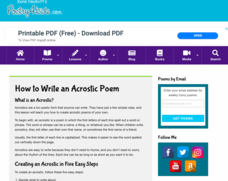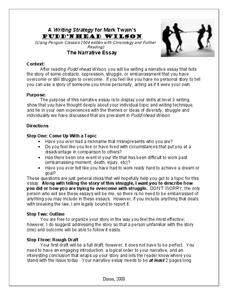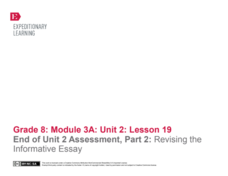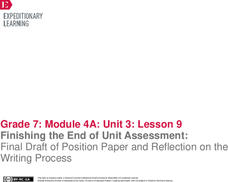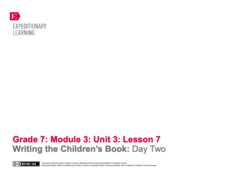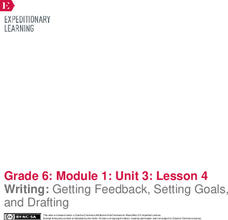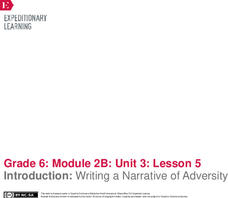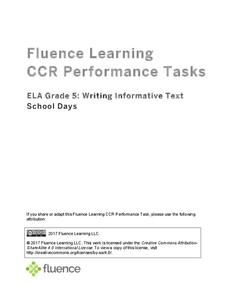EngageNY
Mid-Unit 2 Assessment: On-Demand Informational Writing
Lesson 7 focuses on building academic vocabulary and writing an explanatory letter with supported textual evidence. For the first five minutes of the instructional activity, the educator reminds the class of how to read and refer to the...
Poetry4kids
How to Write an Acrostic Poem
Acrostic poems are perfect for any topic! A quick tutorial guides learners into writing acrostic poems with the basics and key examples.
Poetry4kids
How to Write an Exaggeration Poem
The best poetry writing lesson of all time is here for you! Learn all about the art of exaggeration with a lesson on exaggeration poems, which instructs students to use wild imagery to convey their message.
Massachusetts Institute of Technology
Sentence Structure of Technical Writing
Most teachers and scholars look for a way to simplify information. Informational how-to slides simplify the process of technical writing into a step-by-step process. Learners gather information on what to do, as well as what to avoid....
Anchorage School District
Writing Reference Sheet
Print out this handy reference page double sided and distribute it to your class. Individuals can use the page to aid them as they work on their topic sentences, transitions, conclusions, and paragraph structure. There is plenty of...
Curated OER
Pudd'nhead Wilson: Writing Strategy
Assign this narrative essay after finishing Puddn'head Wilson. Learners write about their own experiences with overcoming obstacles. A five-step process is laid out on this assignment page.
Poetry4kids
How to Write a “Backward” Poem
If you like poetry, wait till you try backward poetry! Young writers read Shel Silverstein's "Backward Bill" before writing their own funny poems that are full of backward imagery and phrasing.
EngageNY
Writing to Inform: Colonial Trades
Fourth graders who are studying life in colonial America engage in an instructional activity that has them create a "Help Wanted" ad that would have been written by a master craftsperson from back in the day. They utilize a graphic...
EngageNY
End of Unit Assessment: Final Position Paper
All good essays must come to an end. Pupils write the final drafts of their position papers about the best food chain from Michael Pollan's The Omnivore's Dilemma. Next, they share their favorite part of their papers with their partners.
EngageNY
End of Unit 2 Assessment, Part 2: Revising the Informative Essay
Is that your final answer? Scholars discuss the terms, edit, and revise. They then complete their final drafts as the end-of-unit assessment of Unbroken. Writers use their graded draft essays from a previous instructional activity to...
EngageNY
Writing an Argumentative Essay: Planning the Essay
A self-assessment helps scholars take ownership of their learning. Using the resource, pupils begin a Writing Improvement Tracker to develop awareness of their writing strengths and challenges. Next, they complete worksheets to plan...
EngageNY
Finishing the End of Unit Assessment: Final Draft of Position Paper and Reflection on the Writing Process
Think about it. Writers think about their end of unit essays through reflection. They use the End of Unit 3 Assessment, Part 2: Reflection on the Writing Process handout to analyze the writing process they used to create their position...
RSA Group
Write About This
Looking for an easy way to encourage youngsters to write about a variety of different topics? Users simply choose an image to write about from a large selection of beautiful photographs and then compose original opinion pieces and...
EngageNY
Preparing to Write Historical Fiction: Determining Characteristics of the Genre
A language arts instructional activity helps young writers identify elements that make up historical fiction. First, it guides them through elements of fictional pieces with vocabulary cards. Then, pupils work collaboratively to...
DLTK
St. Patrick's Day Creative Writing Prompt #3
On March 17th, celebrate St. Patrick's Day with a cheery writing prompt that challenges scholars to finish a prompt detailing what they saw when they woke up on the morning of St. Patrick's Day.
EngageNY
Writing the Children’s Book: Day Two
Following a brief mini-lesson on using dialogue in fiction, young writers continue day two of their writing workshop. They work on the second half of their Children's Book Storyboards, and then they turn and talk with partners to reflect...
EngageNY
Revising the Informative Consumer Guide: Sentence Structure, Transitions, and Works Cited
Transitions are the glue that link paragraphs together. Pupils listen to a mini lesson plan on sentence structure and transitions and use what they learned to revise their informative consumer guides. Next, they self-assess their writing...
EngageNY
Writing: Getting Feedback, Setting Goals, and Drafting
Why is it important to set goals as a writer? Scholars process feedback from their mid-unit assessments, writing down their strengths and weaknesses on index cards. Next, pupils use the feedback to begin drafting their hero's journey...
EngageNY
Introduction: Writing a Narrative of Adversity
A little adversity is good for writing. Scholars review narrative-based monologues and concrete poems and choose which genre to use to express their own theme of adversity. Pupils also consider how to structure their narratives by...
Fluence Learning
Writing Informational Text: Lemonade Stand
Use a performance task to assess third graders' ability to read informational text. After they plan a lemonade stand business, young entrepreneurs implement that plan through informational writing. The task assumes learners can...
Fluence Learning
Writing Informative Text: School Days
A three-part writing assessment challenges scholars to think critically about schools of the past and present. Learners read informative texts, answer questions to prepare for a discussion, research in small groups, complete a Venn...
Fluence Learning
Writing a Narrative: How Bear Lost His Tail
After reading the first, second, and third parts of "How Bear Lost His Tail", third grade writers answer questions about the story by completing a series of options, including discussion points. Then, they begin to plan a new narrative...
Fluence Learning
Writing an Opinion: Is Pride Good or Bad?
Does pride really goeth before the fall, or can it be essential to one's development? Second graders read two of Aesop's fables that refer to pride in their morals, and write a short essay about whether pride is good or bad, based on...
Fluence Learning
Writing an Opinion: Student Council
A three-part assessment challenges scholars to write opinion essays covering the topic of the student council. After reading three passages, writers complete a chart, work with peers to complete a mini-research project, answer...



